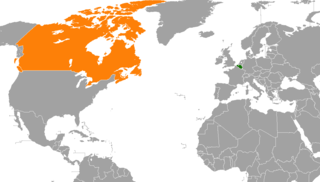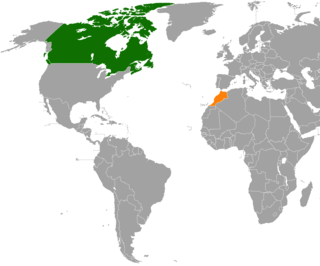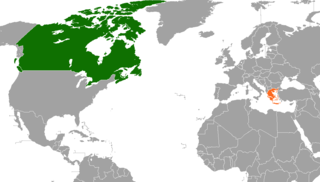
The diplomatic relations between Canada and the French Republic are friendly, the importance of which centres on the history of French immigration to Canada. Canadians of French heritage make up the majority of native speakers of French in Canada, who in turn account for about 22 percent of the country's total population. The small French Territorial Collectivity of Saint Pierre and Miquelon is situated off the coast of Atlantic Canada.

The Embassy of Canada in Washington, D.C. is Canada's main diplomatic mission to the United States. The embassy building designed by Arthur Erickson and opened in 1989 is located at 501 Pennsylvania Avenue Northwest, Washington, D.C., between the United States Capitol and the White House, just north of the National Gallery of Art. In addition to its diplomatic role, the embassy provides consular services for Delaware, Washington, D.C., Maryland, Virginia, and West Virginia. It also hosts a Trade Commissioner Service office responsible for the states of Maryland, Washington, D.C., Virginia, and West Virginia.

An agent-general is the representative in cities abroad of the government of a Canadian province or an Australian state and, historically, also of a British colony in Jamaica, Nigeria, Canada, Malta, South Africa, Australia or New Zealand and subsequently, of a Nigerian region. Australia's and Canada's federal governments are represented by high commissions, as are all Commonwealth national governments today.

The Agence universitaire de la Francophonie is a global network of French-speaking higher-education and research institutions. Founded in Montreal, Quebec, Canada in 1961, as the Association des Universités Partiellement ou Entièrement de Langue Française (AUPELF), the AUF is a multilateral institution supporting co-operation and solidarity among French-speaking universities and institutions. It operates in French-speaking and non-speaking countries of Africa, the Arab world, Southeast Asia, North and South America, Polynesia, the Caribbean, Central, Eastern and Western Europe. As of 2020, the AUF has 1,007 members distributed throughout francophone countries on six continents. It is active in 119 countries, and represented by regional offices and information centers on campuses and in institutes. The Association receives funding from the Organisation internationale de la Francophonie (OIF), and its headquarters are located at the Université de Montréal, Quebec.

The Secretariat of Foreign Affairs is the government department responsible for Mexico's foreign affairs.
Paradiplomacy is the involvement of non-central governments in international relations. The phenomenon includes a variety of practices, from town twinning to transnational networking, decentralized cooperation, and advocacy in international summits. Following the movement of globalisation, non-central governments have been playing increasingly influential roles on the global scene, connecting across national borders and developing their own foreign policies. Regions, states, provinces and cities seek their way to promote cooperation, cultural exchanges, trade and partnership, in a large diversity of ways and objectives depending on their decentralization, cultural, and socio-economical contexts. This trend raises new questions concerning public international law and opened a debate on the global governance regime, and the evolution of the nation-led system that has provided the grounds for the international political order in the last centuries.

The Embassy of Canada in France is the main diplomatic mission of Canada to the French Republic. As of May 2, 2018, the embassy and the Canadian Cultural Centre relocated to 130 rue du Faubourg Saint-Honoré in the 8th arrondissement of Paris, which underwent renovation for that purpose. Previously, the embassy was located at 35 avenue Montaigne, and the Canadian Cultural Centre was located at 5 rue de Constantine in Paris.

Belgium and Canada are close allies. Both have a stance of multilateralism and are members of NATO and Francophonie. The two nations have official bilingualism, and similar federal government systems owing in part to language tensions in both. Both were actively involved in the war in Afghanistan under ISAF.

Canada recognized Morocco de jure on June 19, 1956, shortly after the independence of the latter, and the two countries established diplomatic relations on May 17, 1962. Canada has an embassy in Rabat. Morocco has an embassy in Ottawa and a general consulate in Montreal and in Toronto.
A de facto embassy is an office or organisation that serves de facto as an embassy in the absence of normal or official diplomatic relations among countries, usually to represent nations which lack full diplomatic recognition, regions or dependencies of countries, or territories over which sovereignty is disputed. In some cases, diplomatic immunity and extraterritoriality may be granted.

Canada and Greece first exchanged ambassadors in 1942. Both countries are members of the Organisation for Economic Co-operation and Development, Organisation internationale de la Francophonie, Organization for Security and Co-operation in Europe, NATO and the United Nations. There is a strong Greek community living in Canada.
The Ministry of International Relations and La Francophonie is a department in the Government of Quebec. Its primary task is to "promote and defend Québec’s interests internationally."

The permanent delegate of Australia to the United Nations Educational, Scientific and Cultural Organization is an officer of the Australian Department of Foreign Affairs and Trade and the head of the delegation of the Commonwealth of Australia to the United Nations Educational, Scientific and Cultural Organization (UNESCO) in Paris, France. The position has the rank and status of an ambassador extraordinary and plenipotentiary and is but one of Australia's representatives to the United Nations and its other bodies, shared with the representatives present at the United Nations Office in Geneva, the United Nations Office in Vienna, the United Nations Office at Nairobi, and the delegation to the United Nations Agencies in Rome.












